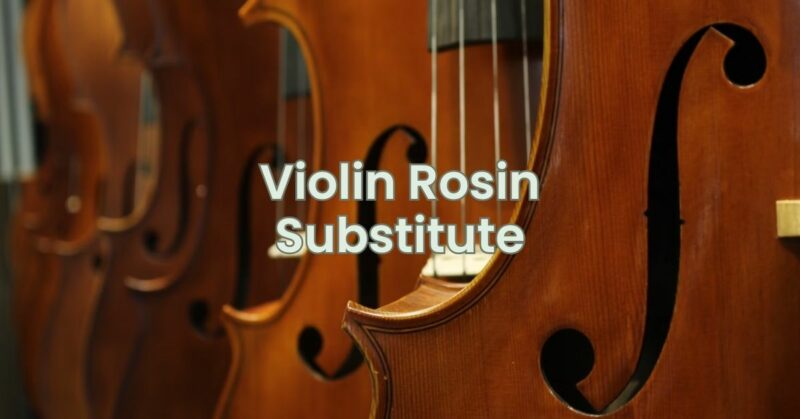Rosin is an essential accessory for string instrument players, providing the necessary friction between the bow hair and strings to produce a clear and resonant sound. However, there may be instances when you find yourself without rosin or in need of an alternative option. In this article, we will explore some violin rosin substitutes that can be used in a pinch, ensuring optimal bowing performance and sound production.
- Colophony-Free Rosin Substitutes: For individuals with allergies or sensitivities to colophony, a common component of rosin derived from tree resin, there are colophony-free alternatives available. These substitutes are typically made from non-allergenic ingredients and offer similar friction properties to traditional rosin.
- Gold Rosin: Gold rosin is a colophony-free substitute that is often made from synthetic materials. It provides good grip and produces a warm tone. Gold rosin is suitable for those with colophony allergies or for players seeking a different sound character.
- Larch Rosin: Larch rosin is another colophony-free substitute that is derived from the resin of larch trees. It offers excellent grip and produces a clear and focused sound. Larch rosin is a popular alternative for those with colophony sensitivities.
- Dusting Agents: In certain situations, when traditional rosin is not available, you can use alternative substances as dusting agents to provide temporary bowing assistance. These substitutes can help reduce bow slipperiness and enhance friction, although they may not offer the same level of control and tonal qualities as rosin.
- Baby Powder or Talcum Powder: Baby powder or talcum powder can be lightly applied to the bow hair to provide temporary grip and reduce slipperiness. It is important to use a minimal amount to avoid excessive buildup or damage to the bow hair.
- Chalk: Chalk, commonly used by gymnasts and climbers to improve grip, can also be utilized as a temporary rosin substitute. Rubbing a small amount of chalk on the bow hair can increase friction and aid in bowing.
- Using a Rosined Cloth: If you have access to a rosin cloth or rosin-infused cloth, it can be an effective substitute in emergency situations. These cloths are pre-loaded with rosin and can be gently rubbed on the bow hair to provide temporary friction and grip. However, their effectiveness may be limited compared to traditional rosin blocks.
Important Considerations: While these alternatives can be used in a pinch, it is important to keep in mind the following considerations:
- Substitutes may not offer the same level of grip, tonal quality, or control as traditional rosin. They are temporary solutions and should not replace regular use of quality rosin.
- It is advisable to consult with a music teacher or experienced players before using substitutes to ensure compatibility with your instrument and playing style.
- Proper cleaning of the bow hair and removal of substitute materials should be done promptly to avoid damage or excessive buildup.
Conclusion: While rosin substitutes can be useful in emergencies or when traditional rosin is unavailable, they are not intended as long-term replacements. Colophony-free rosin alternatives like gold rosin or larch rosin offer suitable options for individuals with colophony allergies. Dusting agents like baby powder or chalk, as well as rosin-infused cloths, can provide temporary assistance in achieving better bowing performance.
Remember to use substitutes sparingly and seek proper rosin as soon as possible to ensure optimal sound quality and bowing control. With the right tools and alternatives at your disposal, you can continue playing your violin with confidence, even in situations where traditional rosin is not readily accessible.

